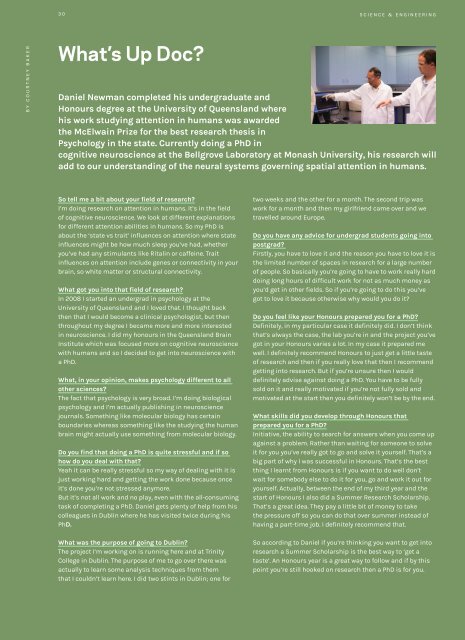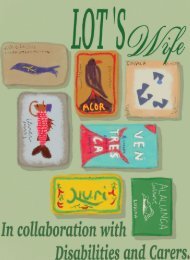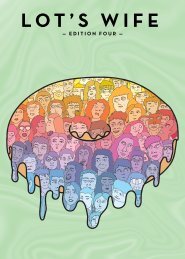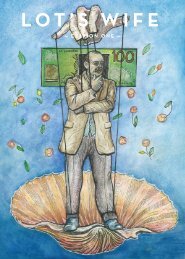Lot's Wife Edition 6 2015
You also want an ePaper? Increase the reach of your titles
YUMPU automatically turns print PDFs into web optimized ePapers that Google loves.
30<br />
SCIENCE & ENGINEERING<br />
BY CoURTNEY BAKER<br />
What’s Up Doc?<br />
Daniel Newman completed his undergraduate and<br />
Honours degree at the University of Queensland where<br />
his work studying attention in humans was awarded<br />
the McElwain Prize for the best research thesis in<br />
Psychology in the state. Currently doing a PhD in<br />
cognitive neuroscience at the Bellgrove Laboratory at Monash University, his research will<br />
add to our understanding of the neural systems governing spatial attention in humans.<br />
So tell me a bit about your field of research?<br />
I’m doing research on attention in humans. It’s in the field<br />
of cognitive neuroscience. We look at different explanations<br />
for different attention abilities in humans. So my Phd is<br />
about the ‘state vs trait’ influences on attention where state<br />
influences might be how much sleep you’ve had, whether<br />
you’ve had any stimulants like Ritalin or caffeine. Trait<br />
influences on attention include genes or connectivity in your<br />
brain, so white matter or structural connectivity.<br />
What got you into that field of research?<br />
In 2008 I started an undergrad in psychology at the<br />
University of Queensland and I loved that. I thought back<br />
then that I would become a clinical psychologist, but then<br />
throughout my degree I became more and more interested<br />
in neuroscience. I did my honours in the Queensland Brain<br />
Institute which was focused more on cognitive neuroscience<br />
with humans and so I decided to get into neuroscience with<br />
a Phd.<br />
What, in your opinion, makes psychology different to all<br />
other sciences?<br />
The fact that psychology is very broad. I’m doing biological<br />
psychology and I’m actually publishing in neuroscience<br />
journals. Something like molecular biology has certain<br />
boundaries whereas something like the studying the human<br />
brain might actually use something from molecular biology.<br />
Do you find that doing a PhD is quite stressful and if so<br />
how do you deal with that?<br />
Yeah it can be really stressful so my way of dealing with it is<br />
just working hard and getting the work done because once<br />
it’s done you’re not stressed anymore.<br />
But it’s not all work and no play, even with the all-consuming<br />
task of completing a Phd. daniel gets plenty of help from his<br />
colleagues in dublin where he has visited twice during his<br />
PhD.<br />
What was the purpose of going to Dublin?<br />
The project I’m working on is running here and at Trinity<br />
College in dublin. The purpose of me to go over there was<br />
actually to learn some analysis techniques from them<br />
that I couldn’t learn here. I did two stints in dublin; one for<br />
two weeks and the other for a month. The second trip was<br />
work for a month and then my girlfriend came over and we<br />
travelled around Europe.<br />
Do you have any advice for undergrad students going into<br />
postgrad?<br />
Firstly, you have to love it and the reason you have to love it is<br />
the limited number of spaces in research for a large number<br />
of people. So basically you’re going to have to work really hard<br />
doing long hours of difficult work for not as much money as<br />
you’d get in other fields. So if you’re going to do this you’ve<br />
got to love it because otherwise why would you do it?<br />
Do you feel like your Honours prepared you for a PhD?<br />
definitely, in my particular case it definitely did. I don’t think<br />
that’s always the case, the lab you’re in and the project you’ve<br />
got in your Honours varies a lot. In my case it prepared me<br />
well. I definitely recommend Honours to just get a little taste<br />
of research and then if you really love that then I recommend<br />
getting into research. But if you’re unsure then I would<br />
definitely advise against doing a Phd. You have to be fully<br />
sold on it and really motivated if you’re not fully sold and<br />
motivated at the start then you definitely won’t be by the end.<br />
What skills did you develop through Honours that<br />
prepared you for a PhD?<br />
Initiative, the ability to search for answers when you come up<br />
against a problem. Rather than waiting for someone to solve<br />
it for you you’ve really got to go and solve it yourself. That’s a<br />
big part of why I was successful in Honours. That’s the best<br />
thing I learnt from Honours is if you want to do well don’t<br />
wait for somebody else to do it for you, go and work it out for<br />
yourself. Actually, between the end of my third year and the<br />
start of Honours I also did a Summer Research Scholarship.<br />
That’s a great idea. They pay a little bit of money to take<br />
the pressure off so you can do that over summer instead of<br />
having a part-time job. I definitely recommend that.<br />
So according to daniel if you’re thinking you want to get into<br />
research a Summer Scholarship is the best way to ‘get a<br />
taste’. An Honours year is a great way to follow and if by this<br />
point you’re still hooked on research then a Phd is for you.

















